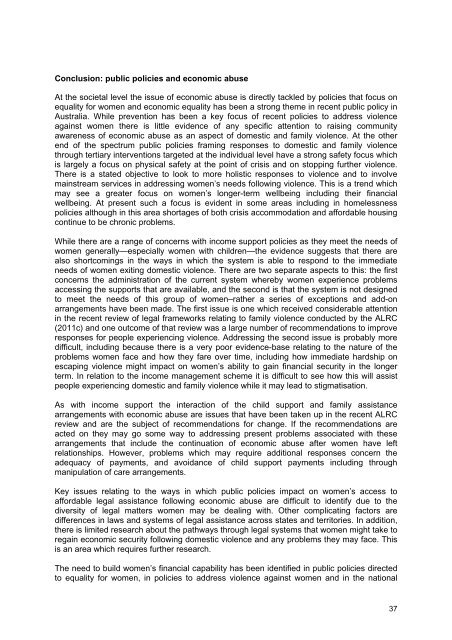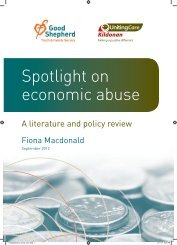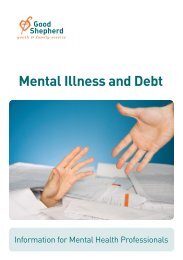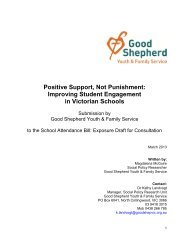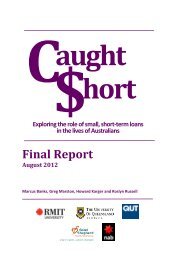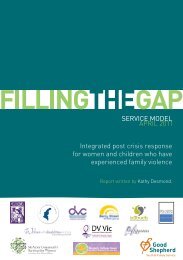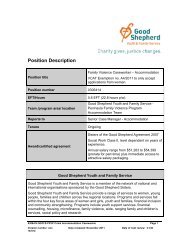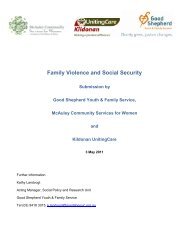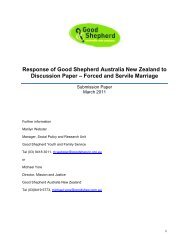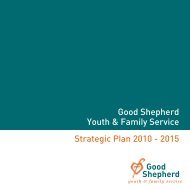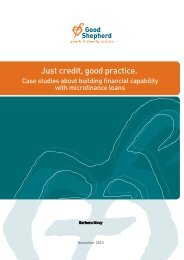Spotlight on Economic Abuse: a Literature and Policy Review
Spotlight on Economic Abuse: a Literature and Policy Review
Spotlight on Economic Abuse: a Literature and Policy Review
Create successful ePaper yourself
Turn your PDF publications into a flip-book with our unique Google optimized e-Paper software.
C<strong>on</strong>clusi<strong>on</strong>: public policies <strong>and</strong> ec<strong>on</strong>omic abuse<br />
At the societal level the issue of ec<strong>on</strong>omic abuse is directly tackled by policies that focus <strong>on</strong><br />
equality for women <strong>and</strong> ec<strong>on</strong>omic equality has been a str<strong>on</strong>g theme in recent public policy in<br />
Australia. While preventi<strong>on</strong> has been a key focus of recent policies to address violence<br />
against women there is little evidence of any specific attenti<strong>on</strong> to raising community<br />
awareness of ec<strong>on</strong>omic abuse as an aspect of domestic <strong>and</strong> family violence. At the other<br />
end of the spectrum public policies framing resp<strong>on</strong>ses to domestic <strong>and</strong> family violence<br />
through tertiary interventi<strong>on</strong>s targeted at the individual level have a str<strong>on</strong>g safety focus which<br />
is largely a focus <strong>on</strong> physical safety at the point of crisis <strong>and</strong> <strong>on</strong> stopping further violence.<br />
There is a stated objective to look to more holistic resp<strong>on</strong>ses to violence <strong>and</strong> to involve<br />
mainstream services in addressing women’s needs following violence. This is a trend which<br />
may see a greater focus <strong>on</strong> women’s l<strong>on</strong>ger-term wellbeing including their financial<br />
wellbeing. At present such a focus is evident in some areas including in homelessness<br />
policies although in this area shortages of both crisis accommodati<strong>on</strong> <strong>and</strong> affordable housing<br />
c<strong>on</strong>tinue to be chr<strong>on</strong>ic problems.<br />
While there are a range of c<strong>on</strong>cerns with income support policies as they meet the needs of<br />
women generally—especially women with children—the evidence suggests that there are<br />
also shortcomings in the ways in which the system is able to resp<strong>on</strong>d to the immediate<br />
needs of women exiting domestic violence. There are two separate aspects to this: the first<br />
c<strong>on</strong>cerns the administrati<strong>on</strong> of the current system whereby women experience problems<br />
accessing the supports that are available, <strong>and</strong> the sec<strong>on</strong>d is that the system is not designed<br />
to meet the needs of this group of women–rather a series of excepti<strong>on</strong>s <strong>and</strong> add-<strong>on</strong><br />
arrangements have been made. The first issue is <strong>on</strong>e which received c<strong>on</strong>siderable attenti<strong>on</strong><br />
in the recent review of legal frameworks relating to family violence c<strong>on</strong>ducted by the ALRC<br />
(2011c) <strong>and</strong> <strong>on</strong>e outcome of that review was a large number of recommendati<strong>on</strong>s to improve<br />
resp<strong>on</strong>ses for people experiencing violence. Addressing the sec<strong>on</strong>d issue is probably more<br />
difficult, including because there is a very poor evidence-base relating to the nature of the<br />
problems women face <strong>and</strong> how they fare over time, including how immediate hardship <strong>on</strong><br />
escaping violence might impact <strong>on</strong> women’s ability to gain financial security in the l<strong>on</strong>ger<br />
term. In relati<strong>on</strong> to the income management scheme it is difficult to see how this will assist<br />
people experiencing domestic <strong>and</strong> family violence while it may lead to stigmatisati<strong>on</strong>.<br />
As with income support the interacti<strong>on</strong> of the child support <strong>and</strong> family assistance<br />
arrangements with ec<strong>on</strong>omic abuse are issues that have been taken up in the recent ALRC<br />
review <strong>and</strong> are the subject of recommendati<strong>on</strong>s for change. If the recommendati<strong>on</strong>s are<br />
acted <strong>on</strong> they may go some way to addressing present problems associated with these<br />
arrangements that include the c<strong>on</strong>tinuati<strong>on</strong> of ec<strong>on</strong>omic abuse after women have left<br />
relati<strong>on</strong>ships. However, problems which may require additi<strong>on</strong>al resp<strong>on</strong>ses c<strong>on</strong>cern the<br />
adequacy of payments, <strong>and</strong> avoidance of child support payments including through<br />
manipulati<strong>on</strong> of care arrangements.<br />
Key issues relating to the ways in which public policies impact <strong>on</strong> women’s access to<br />
affordable legal assistance following ec<strong>on</strong>omic abuse are difficult to identify due to the<br />
diversity of legal matters women may be dealing with. Other complicating factors are<br />
differences in laws <strong>and</strong> systems of legal assistance across states <strong>and</strong> territories. In additi<strong>on</strong>,<br />
there is limited research about the pathways through legal systems that women might take to<br />
regain ec<strong>on</strong>omic security following domestic violence <strong>and</strong> any problems they may face. This<br />
is an area which requires further research.<br />
The need to build women’s financial capability has been identified in public policies directed<br />
to equality for women, in policies to address violence against women <strong>and</strong> in the nati<strong>on</strong>al<br />
37


